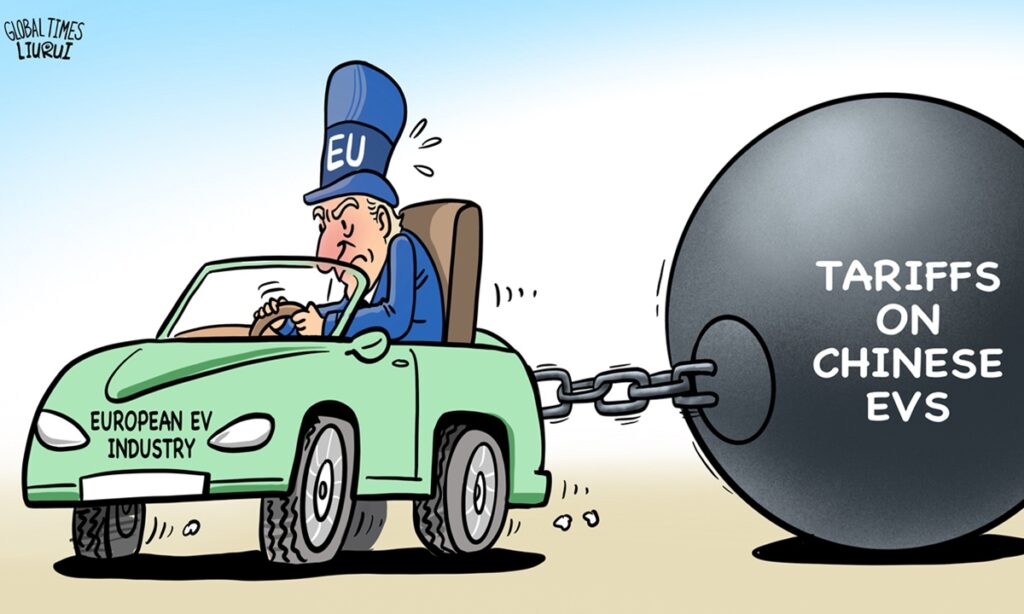On Tuesday, the European Commission announced the final ruling of the anti-subsidy investigation into electric vehicles (EVs) from China. Starting on Wednesday, the EU will impose definitive countervailing duties on imports of battery EVs from China for a period of five years. However, it also stated that the EU and China continue to work toward finding alternative, WTO-compatible solutions. In response, a spokesperson for the Chinese Ministry of Commerce expressed on Wednesday that China does not approve of or accept the ruling and has appealed to the WTO’s dispute settlement mechanism over the issue. The spokesperson urged the European side to work constructively with China to advance the next phase of technical team consultations and strive to reach a mutually acceptable solution as soon as possible to avoid an escalation of trade frictions.
Although both China and Europe will continue to work toward a price commitment solution, we must express our deep regret regarding the European Commission’s current final ruling, which raises a white flag to protectionism. The German Association of the Automotive Industry’s President, Hildegard Mueller, said the decision was “a step backward for free global trade,” and we share the same concern. Fundamentally, the EU’s tariff decree represents a 21st-century “horse-drawn carriage protection law,” which seeks to close markets and exclude fair competition, essentially sheltering its own underperforming capacity in the EV sector in a greenhouse. This is a step back for free trade.

From the initiation of the so-called anti-subsidy investigation by the European Commission to the announcement of the final ruling, it’s all about Europe engaging in protectionist practices under the guise of “fair competition,” while actually implementing “unfair competition.” It is understandable for the EU, as a traditional powerhouse of the global automotive industry, to feel anxious about new developments in the automotive sector. However, blaming the comparative disadvantage of its own competitiveness on Chinese enterprises for “enjoying unfair subsidies” is a kind of evasion like burying its head in the sand and a lack of fair competition spirit.
The global competitiveness of Chinese EVs stems from efficient manufacturing, a robust supply chain, and continuous technological innovation. These advantages achieved not through “small yard, high fence” strategy but through open cooperation. If Europe continues to combat market competition with protectionism, it risks missing a valuable window for industrial upgrading and technological advancement. During the oil crisis, protectionism failed to stop the influx of affordable, fuel-efficient Japanese cars into Western markets; similarly, over the past 40 years, protectionism has not halted the decline in competitiveness of the US steel and shipbuilding industries. In today’s highly globalized automotive industry, such decision will only hinder European carmakers from accessing advanced new energy technologies.
Some media reports indicate that before the EU votes on whether to impose the tariffs, US diplomats visited several EU member states, allegedly lobbying them to take a “tougher stance” on China. Some voices suggest that the European Commission’s decision to impose tariffs on Chinese EVs is politically motivated, aiming to win appraise of so-called “China hardliners.” However, whether in developing emerging industries like EVs or achieving long-term stability and prosperity, Europe’s future depends on enhancing its competitiveness through free trade. “Getting tough on China” is unlikely to give Europe any strategic advantage.
The reason why the European Commission and China have reached this point, missing numerous opportunities for a simpler resolution, is largely because some people attempted to send China a so-called “political signal,” even sought to “set rules” through this case. This approach has unnecessarily added a polarized political perspective to trade issues that could have been resolved through balance, complementarity, and coordination.
In fact, as long as the EU still recognizes that free trade – not protectionism – is its foundational principle, then returning to a path of cooperation rather than amplifying confrontation is the most prudent choice. Only an open, fair, and autonomous Europe can attract global investment and collaboration.
Resolving differences through dialogue has always been a key feature of China-EU relations, and it remains an EU advantage in a constantly shifting international landscape. China is a staunch promoter of economic globalization that benefits all and is inclusive. This is in the interest of all parties in the world, including China and Europe.
China also believes that a strategically autonomous EU has the willingness and capability to resolve trade disputes with China through dialogue and consultation in the new global trade landscape, and to uphold the global multilateral trading system. Hopefully the European Commission will show an attitude and actions that meet China halfway as soon as possible.
GT



